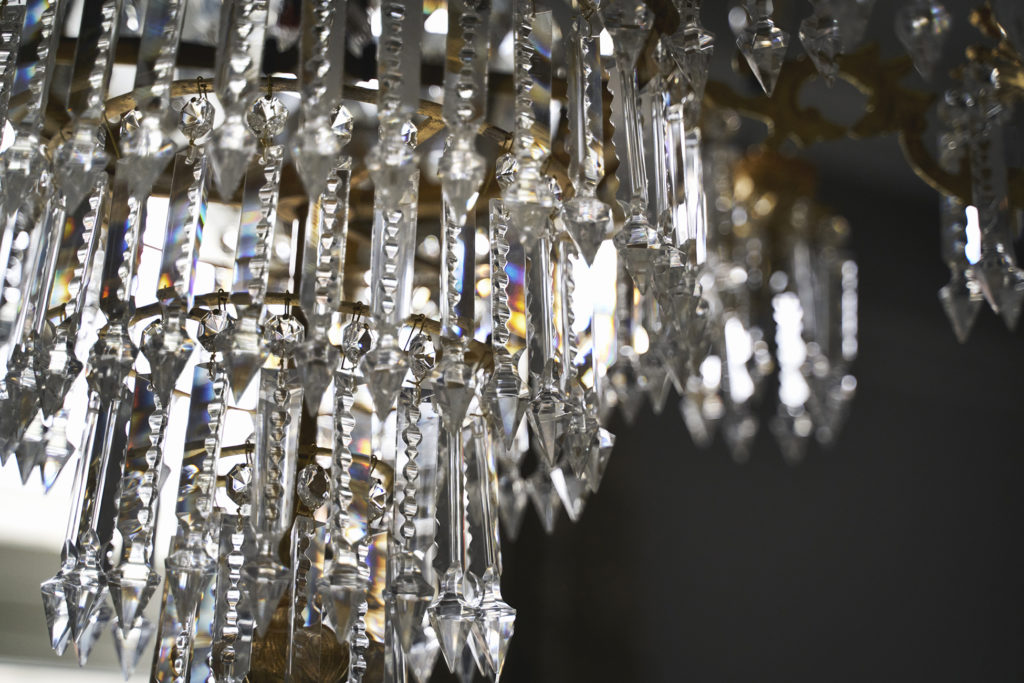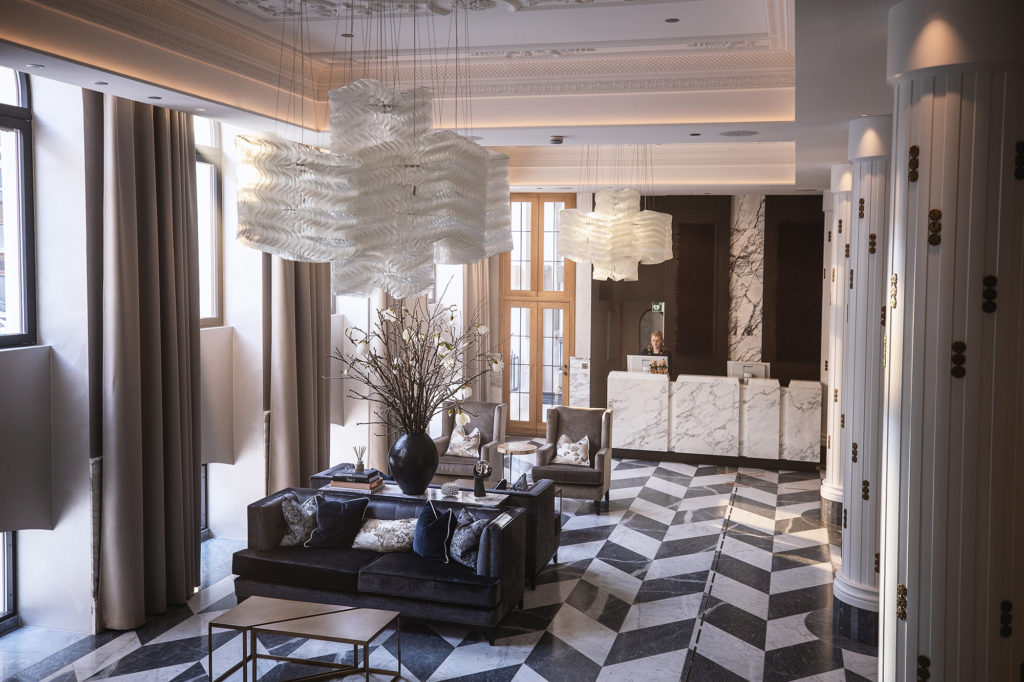
The historical Britannia Hotel in Trondheim opened in April 2019, following a three-year, top-to-toe refurbishment. During the years it was closed, the hotel underwent a major renovation and new build, with the interior deign led by myself and Hanne Gathe from Metropolis Architecture and Design in Oslo.
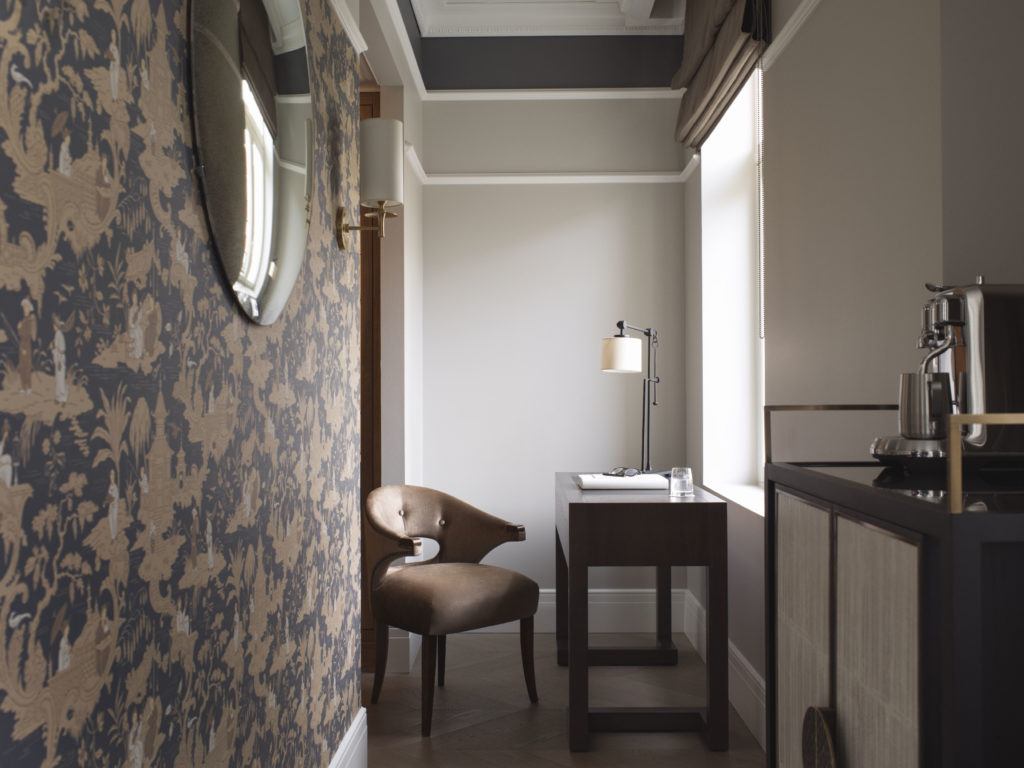
After years of neglect this beautiful hotel from 1870 shines again in a modern classical style, inspired by its long history and with a nod to the British. Today, Britannia offers 233 beautifully designed rooms and suites, with marble tiled bathrooms, Hästens beds, classical tapware and all the amenities you will expect from a five-star luxury hotel.
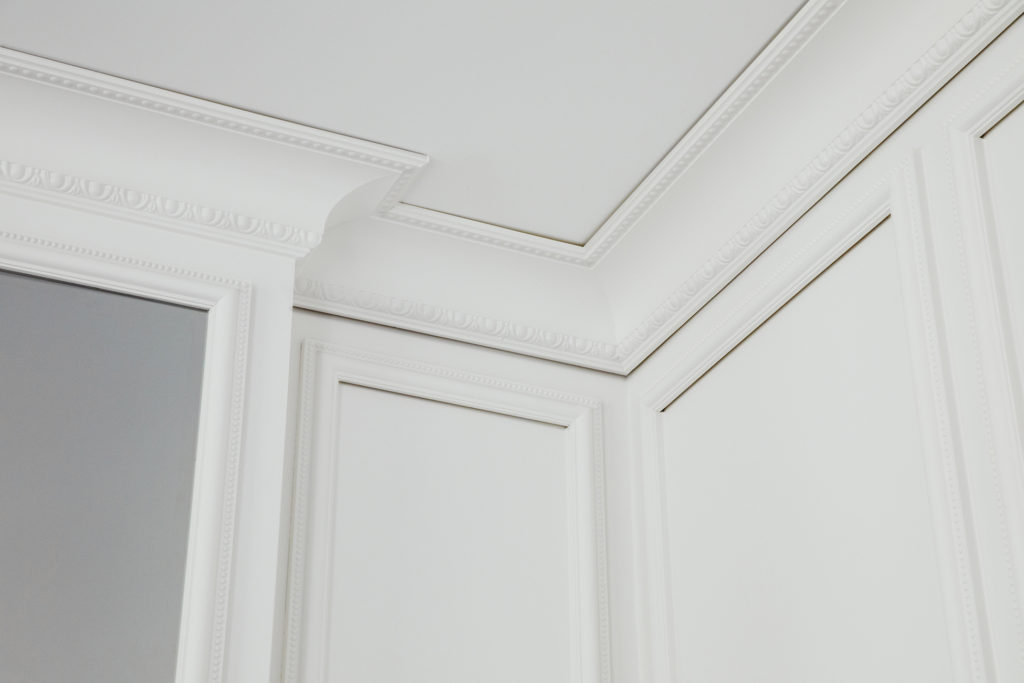
The rooms all have a bespoke wall moldings, with beading created from designs found in photos of the old hotel. The bathrooms are all marble clad, with each category going up in quality of stone and complexity of marble pattern. We travelled to the Carrara mountains in Italy to hand-select the slabs that suited the hotel, with Ellingard getting the job to install and supply.
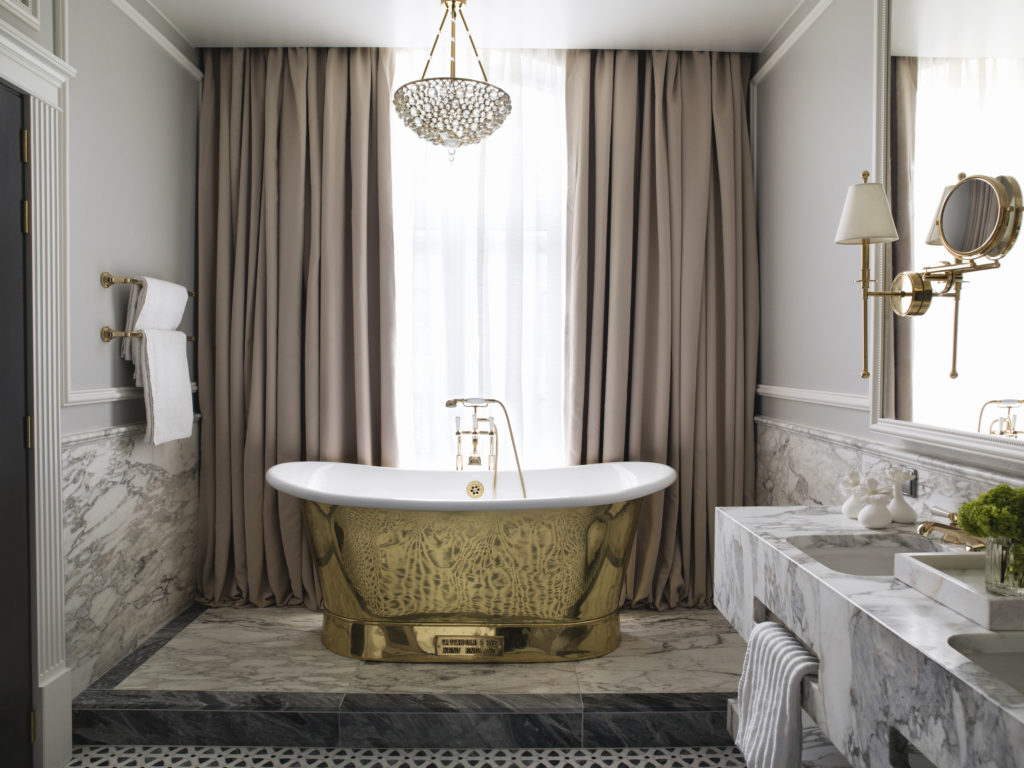
The larger suites have incorporated several British suppliers, such as the wallpaper from Fromental, brass bathtubs from Catchpole and Rye, lighting from Heathfield & Co and Best & Lloyd. The TVs have been disguised behind tinted, floor-to-ceiling mirrors and the all the rooms have a large minibar with coffee making facilities. If you need ice, you will find the machines near the lifts, beautifully set into the walls with a frame in Lilac marble from Turkey and brass framing. It’s all about the detail in a project like this.
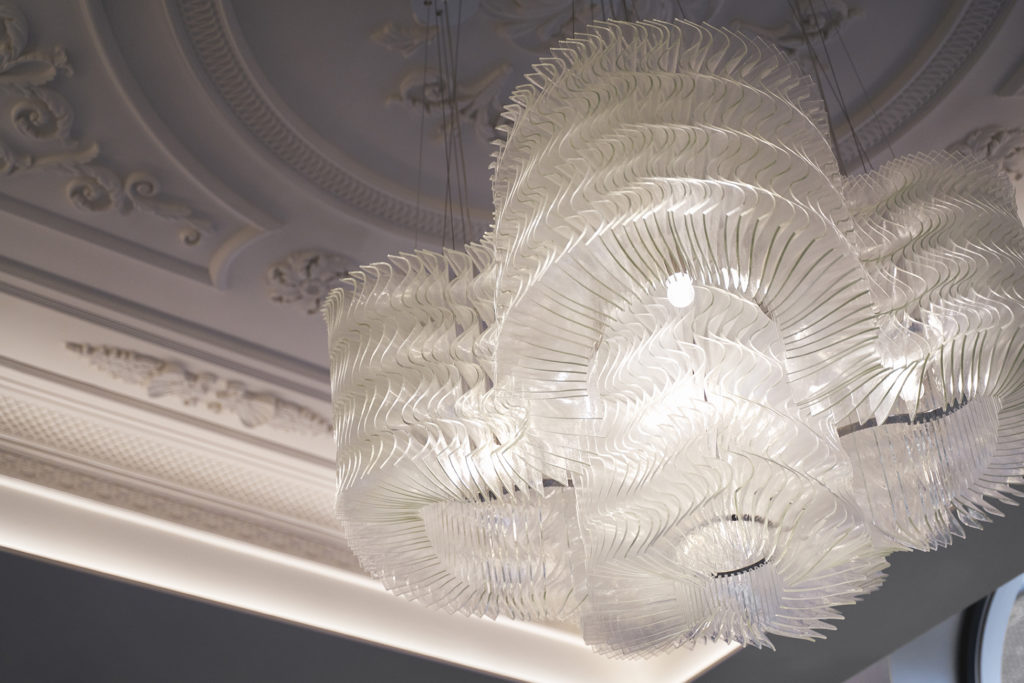
The marble-clad hotel lobby welcomes you in with carefully selected marble from the Carrara mountains, a modern take on the classical chess pattern in a Bardiglio and Carrara marble. The ceiling moldings have been made in the UK to match original moldings and two large chandeliers from Lasvit provide the finishing touch.
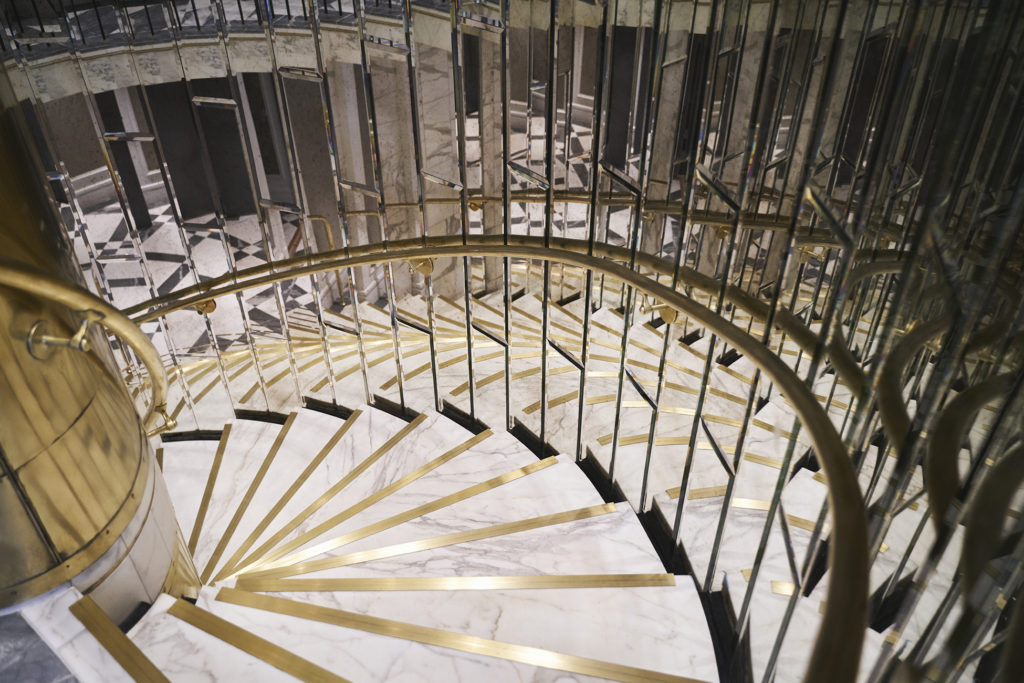
Arne Korsmo’s legacy
The inspiration for the extensive use of marble in this lobby came from architect Arne Korsmo’s refurbishment in the 60s. He clad almost the entire ground and lower ground floor in an exclusive Calacatta gold marble. This was the starting point for the lobby’s design. One of the first things you notice on your way in is the gold phone box on the righthand side. This is one of the items still left from Korsmo’s refurbishment, along with the staircase leading you down into the lower ground floor. We covered the walls in faceted mirrors to reflect light down into the lower ground and to emphasize the beautiful details in the marble staircase, which Korsmo had so beautifully executed.
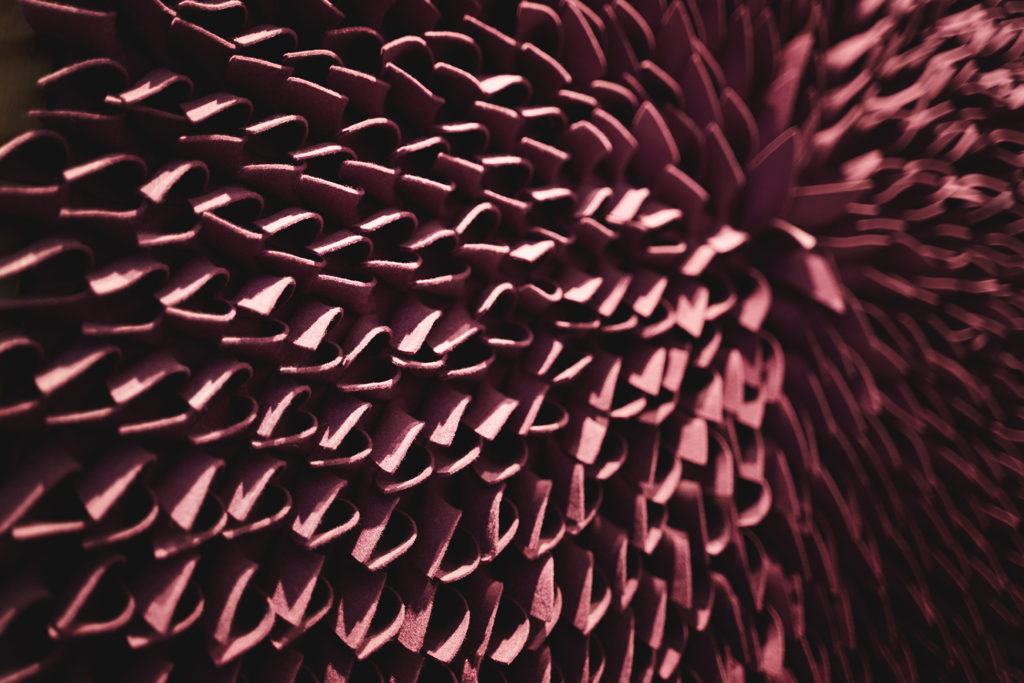
The furniture has been upholstered in darker fabrics to ground the design and a stunning marble fireplace surround from the English brand Chesney’s gives a warm focal point by the concierge desk. We found carved flowers in all the old wooden doors on the first floor and have used the motive throughout, from the columns to the staircase. The main staircase has an iron railing with gold flowers on one side and a wooden railing on the other. This is a nod to the two eras of the hotel, the original wooden hotel prior to 1897 and the railing designed by Korsmo in 1963.
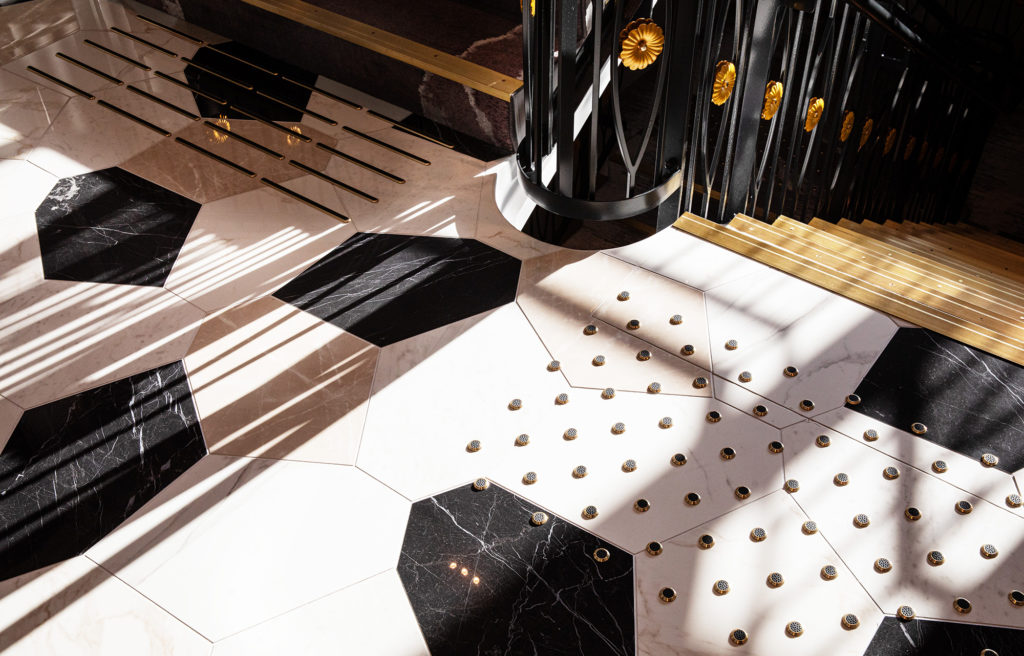
Downstairs you find the hotel’s main toilets. The men’s toilet closest to Jonathan was inspired by the London tube stations, with classical tiling in patterns you will find in stations such as Regents Park in central London. The women’s toilets were perhaps the best preserved remnants of Kosmo’s renovations. Clad in pale pink mosaic, this became the inspiration for the new women’s toilets. They now have mixture of feminine colours, with soft white marble tiles complimented by pink mosaics and a large central unit with grey travertine basins. We wanted this area to have space, so groups of girlfriends could sit by the oval shaped makeup tables. A little nod to Korsmo’s 60s design, with a modern, elegant feel.
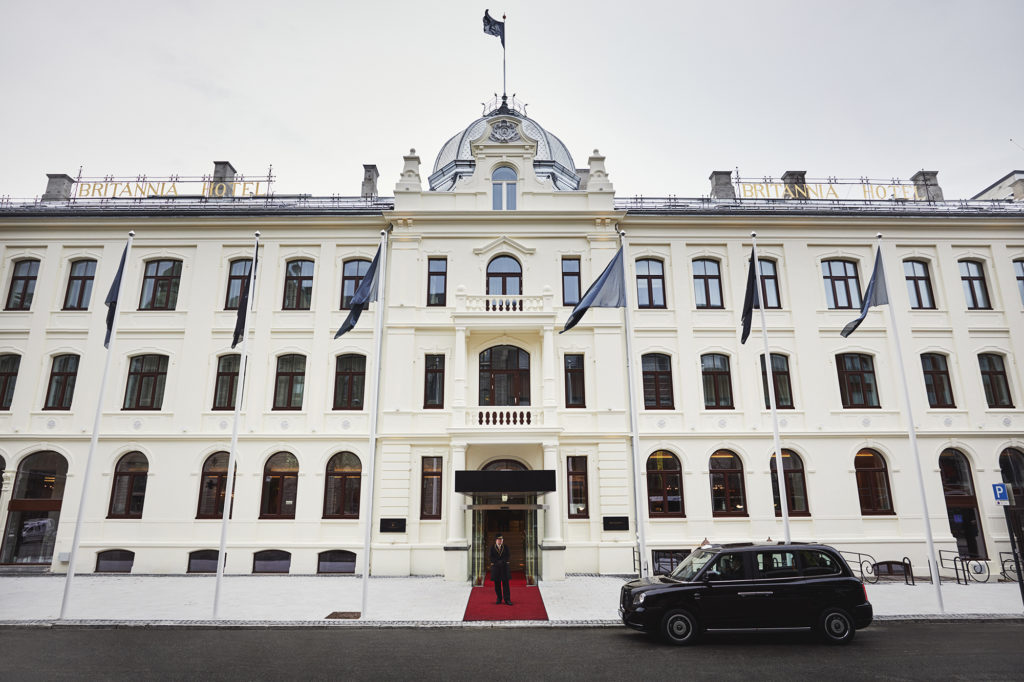
A House of purpose
Britannia has several restaurants, all with different interior styles reflecting their different cuisines. The modern Brasserie, for example, has a variety of tiles, including those on the front of the bar, which have been sourced from the same supplier that delivers the glazed metro tiles to the London underground.
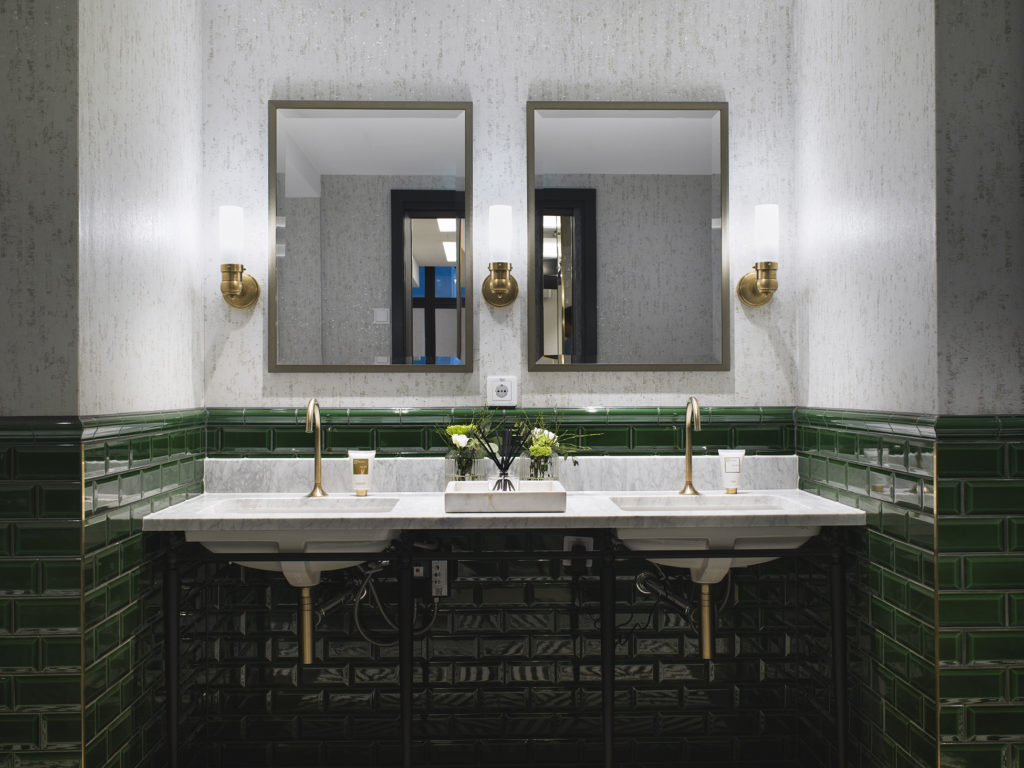
The cocktail bar had original wood panelling that was unfortunately so damaged with rot we were unable to salvage it. So, we had them remade, although lightened to bring more light into a formerly very dark space. We’ve opened up the wall between the old salons that were once just used for functions, bringing new life to the oldest part if the hotel. The original fireplace from 1870 has been restored, as have the wall murals from the 1920s which were painted by an artist as payment for his stay at the hotel (hung in the inner salon).
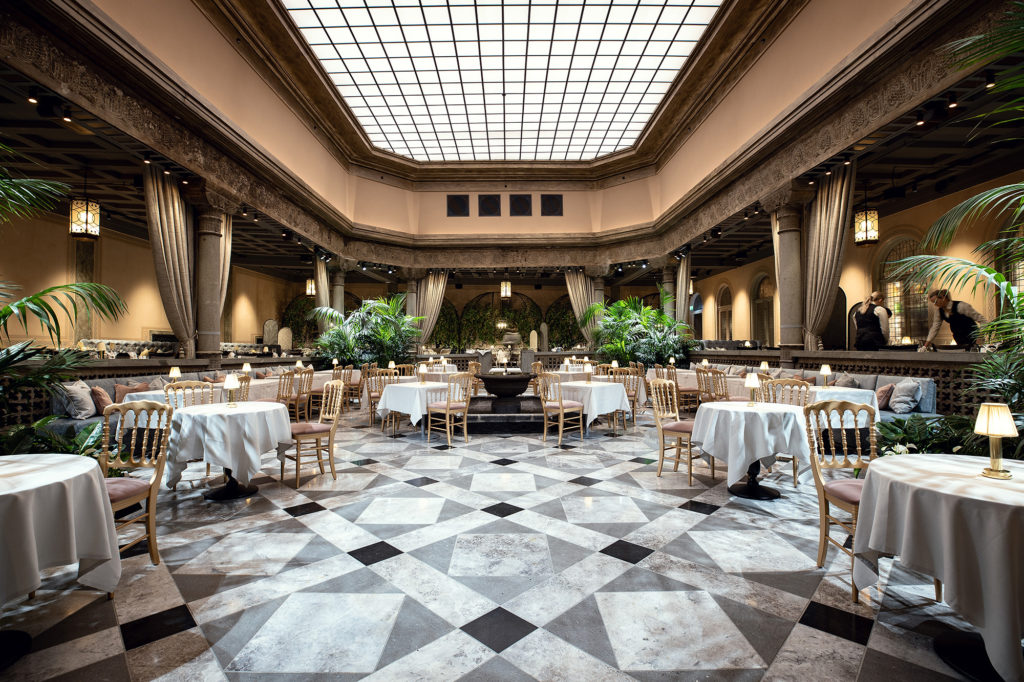
Palmehaven, built in 1918, is the heart of the hotel. With its grand granite columns and palms, this was one of the areas we spent the longest considering. Working closely with Trondheim’s town historians, the original patterns have been brought back to the walls and the new stone floor is closely matched with the stone pattern that was once there.
Is it any surprise that Norwegians would be really good at lighting, leading to rooms like the Palmehaven dining hall, has a natural-looking golden glow, despite having no exterior windows?
Ann Abel, writing for Forbes, January 2021
Britannia’s original spa has received a new reception area and wardrobes in a new theme; the new design nods towards colonial tropical. You are met by a wall of greenery leading you into the stunning reception area.
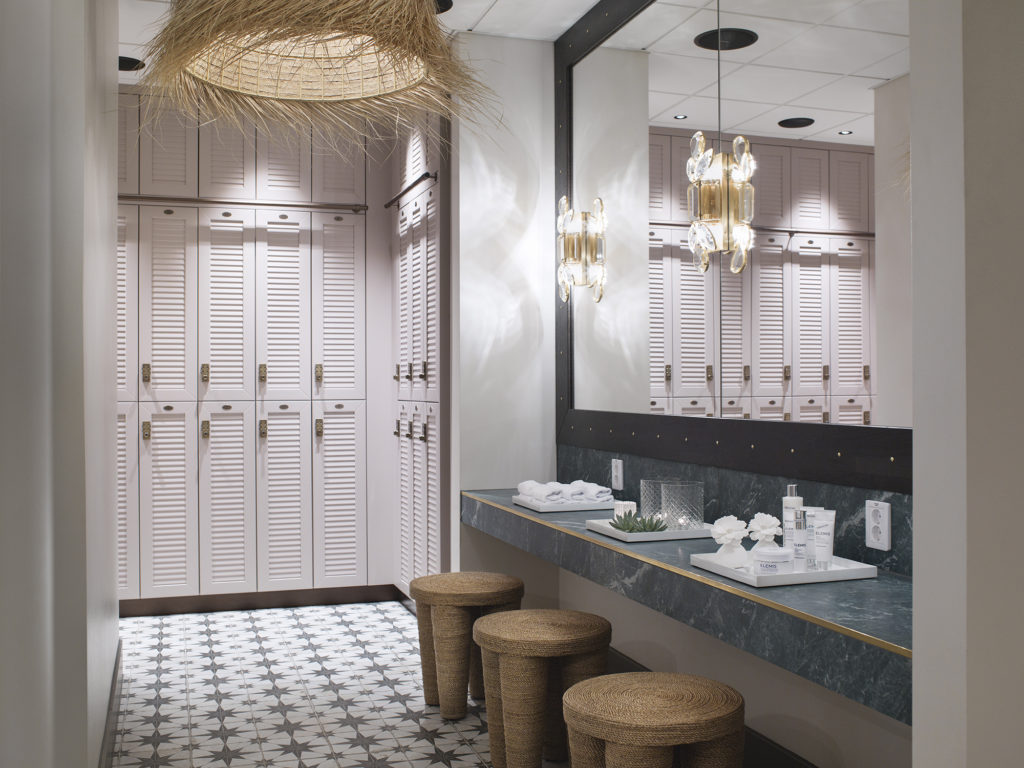
The hotel also has a brand new convention centre, with several meeting rooms, large mingling spaces, all decorated beautifully with modern classical furnishings and bespoke lighting. Marble tiling throughout really makes this business centre stand out from the crowd.
Speilsalen
In the fine dining restaurant, Speilsalen, the original architecture had been maintained, with fishbone flooring being made to match the damaged original floor and a beautiful English landscape wallpaper from Fromental replacing the worn wallpaper installed in the 80s.
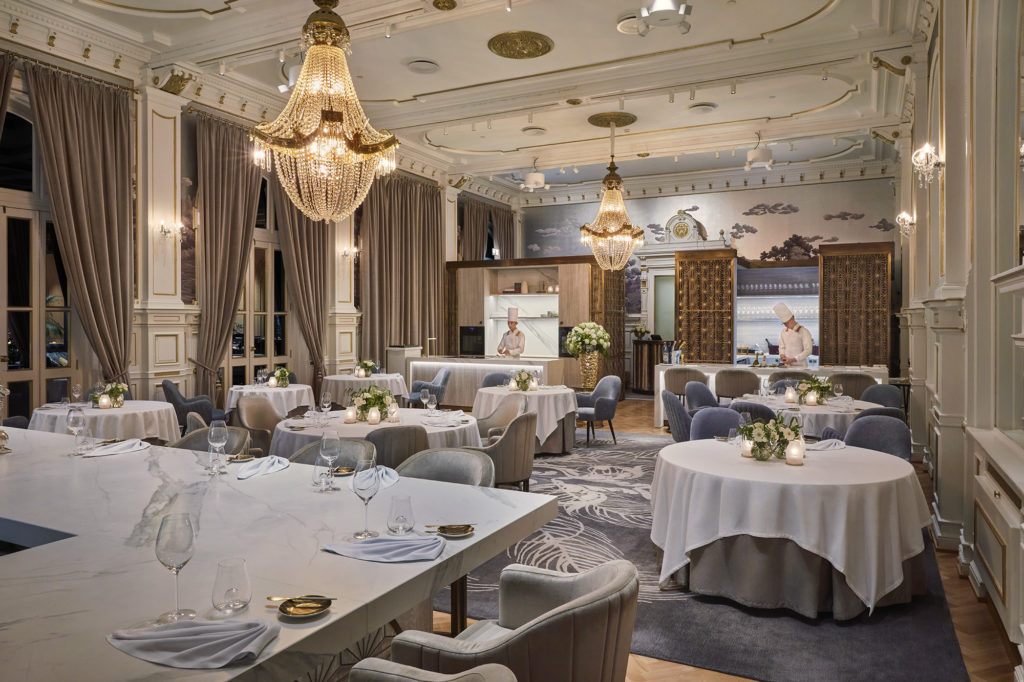
This year, we undertook a new task in Speilsalen is to create a more vibrant restaurant with chefs and sommeliers stations, showcasing the chefs’ prowess. Speilsalen is a listed room, so the design needed to be unique, but also “blend in” with the surroundings in a tasteful manner. Our experience from the first year told us that acoustics in the room require the use of softer materials. We have used one of the patented designs from Christopher’s plates to create a unique mesh surrounding the back of the kitchen counters, creating a softer and more smooth impression.
In the entrance we are implementing a wardrobe with mirror to create a “bigger impression” in the entry area. Very much on brand! There is now a caviar station and a wine room for private tasting during dinner, so we can create a more unique experience.
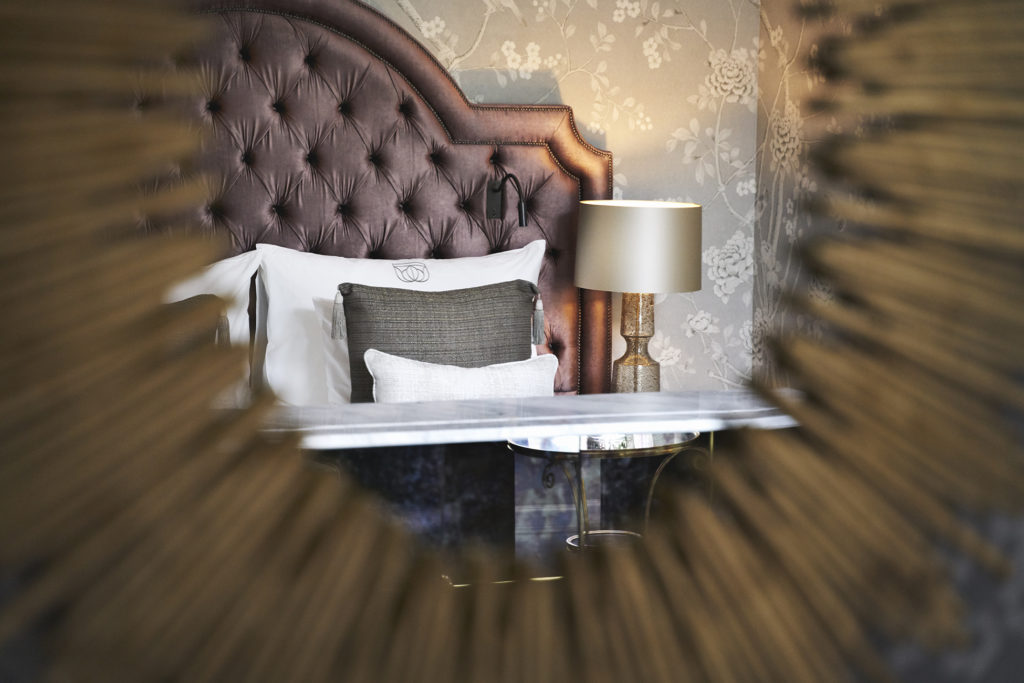
Linda and Hanne were contracted to the design work under their previous employer, Metropolis. Since the completion of the Britannia project, Linda and Hanne have joined forces and opened an interior design company. Their showroom is in Behrensgate in Frogner.
Stay tuned to hear more about the design details Britannia Hotel. In future articles we will be looking into the restaurant concepts in more details, and exploring some of the hotel's artwork.
